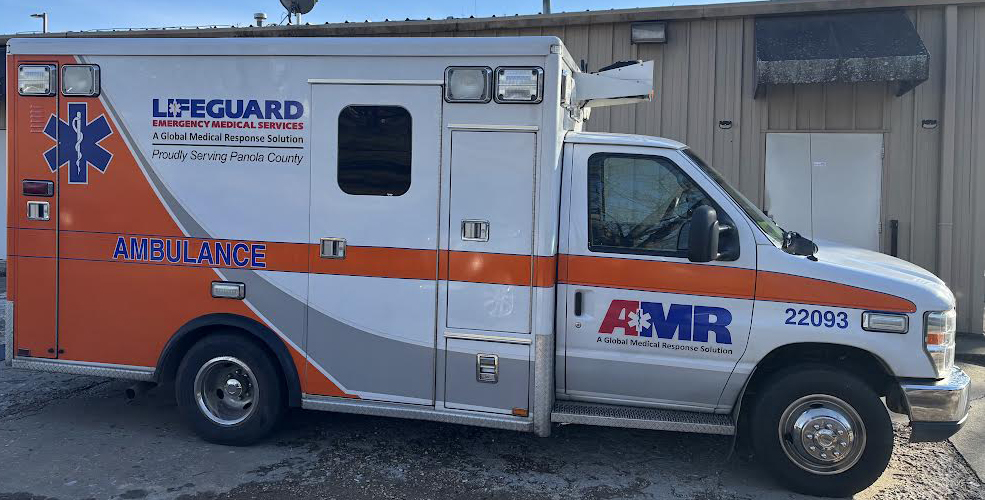Lifeguard told to curtail hospital pickups
Published 9:44 am Wednesday, January 15, 2025
Supervisors say non-emergency transfers making ambulance wait times long
Staff Report
Faced with the looming annual cost of more than $900,000 a year to continue Panola County’s contract with Lifeguard Ambulance Service, the Board of Supervisors this week made the long-considered decision to stop paying for transports out of Progressive Health of Batesville, formerly Panola Medical Center.
In a statement from the board, the supervisors said the decision was “not lightly considered, and after exhausting other avenues, it was the best decision possible for the benefit of the citizens of Panola County.”
The supervisors had, as early as October of last year, warned representatives of Progressive Health that Lifeguard’s high number of transfers from the facility was taxing the ambulance service’s ability to provide coverage across the county.
Progressive Health, owned privately by an investment group based in Oxford, last year got state designation as a Rural Emergency Hospital, meaning the level of patient care was decreased with the focus shifting to immediate and life-saving healthcare in an ER-type setting.
This decision meant that the great majority of people taken to the Batesville facility were stabilized and then approved for transfer from Batesville to Southaven, Oxford, Tupelo, or other regional hospitals that could provide advanced treatments.
Those transfers have been the root of the problem for the supervisors and the Lifeguard. While Panola’s taxpayers fund the nearly $55,000 per month contract to keep at least three ambulances, records show that more than 75 hours a week are spent transporting patients from the Batesville facility to hospitals, clinics, and assisted living homes.
Panola County is not reimbursed for those transfers completed by Lifeguard ambulances, and further, citizens calling 911 for emergencies have too frequently been unable to get service.
In short, supervisors maintain, Panola County citizens with serious, and sometimes critical, medical emergencies must wait extended periods for an ambulance – only to later learn that Lifeguard units had been dispatched for transport of patients for tests and other non-emergency procedures.
Several cases of heart attacks and strokes have been reported to the supervisors in the past year with families left to transport patients in their private vehicle or wait extended times for an EMT. Board members said they were willing to allow the private business to use the county’s contracted ambulances free of charge until taxpayers began waiting for ambulances behind transports for Progressive Health’s patients.
Lifeguard representatives released the following statement late last week, and the company’s regional director Steve Peacock was in attendance at Monday’s board meeting to further discuss the situation with supervisors:
The statement says: “Lifeguard Ambulance Service (Lifeguard) is honored to serve the community of Panola County, and we are proud to have developed a collaborative and cohesive partnership with both County leadership and Progressive Health of Batesville over the past 7 years.
Per the Mississippi EMS Code, we are required to announce that beginning January 20, Lifeguard Panola County will no longer provide ambulance transports out of Progressive Health of Batesville. This change in service comes at the direction of the County. However, Lifeguard will continue providing emergent care out in the community and transporting patients to an appropriate medical facility.
As we navigate this change, we remain committed to continuing to provide high-quality emergency medical services to the residents of Panola County.”
In the past weeks the supervisors have met with Progressive Health officials, asking that business to pay for a share of the service. An annual participation of $150,000 from Progressive Health, would be enough to restructure the county’s contract with Lifeguard to allow for another transport ambulance to be placed in service.
Board president Cole Flint said the situation had reached a point that worried he and fellow supervisors that the health and well being of the county’s residents were in danger because of the lack of full county coverage, forcing them to make the difficult decision.
Flint also emphasized the board’s appreciation of Lifeguard’s willingness to routinely pull ambulances from neighboring counties to assist in Panola when the regular three ambulances under contract are tied up.
Board members acknowledged that while Lifeguard has been patient and often provided the county with more than 60 hours of extra EMT service a week at no charge, business models are not built on money-losing practices, and eventually Lifeguard would not continue to allow those weekly losses without negotiating for a higher sum.






